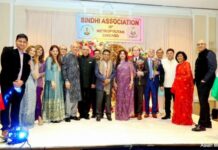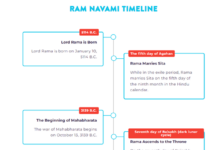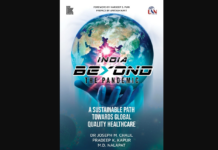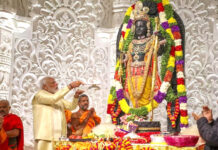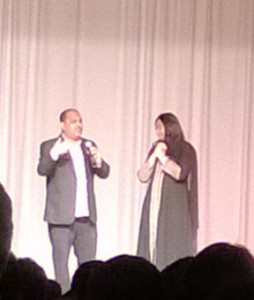 MILPITAS, CA: Enacte Arts prides itself on bringing quality acts to the Bay Area, and the stand-up comedy by Anuvab Pal at the India Community Center in Milpitas was no exception. The presence of a stellar entertainer and a receptive audience was already a dynamic mix for an entertaining evening; the introduction by Dr. Priya Satia of Stanford as a preamble to understanding the inherent humor related to British in India was the cherry on top. The stage was set for a lively, intellectually stimulating, gut roaring time!
MILPITAS, CA: Enacte Arts prides itself on bringing quality acts to the Bay Area, and the stand-up comedy by Anuvab Pal at the India Community Center in Milpitas was no exception. The presence of a stellar entertainer and a receptive audience was already a dynamic mix for an entertaining evening; the introduction by Dr. Priya Satia of Stanford as a preamble to understanding the inherent humor related to British in India was the cherry on top. The stage was set for a lively, intellectually stimulating, gut roaring time!
As an associate professor of modern British history, Dr. Satia wanted to explore why references to British imperialism and post colonial India would be funny. She touched upon racism, a fodder for many humorists, in which a handful of people are trying to rule a vast country…specific examples of the Brits calling the Himalayas, “hills”, or calling Chinese and Indian workers in Malaysia, “foreign natives” appear funny because of their ludicrousness.
The registers of comical can be controversial…if you can joke about something, it points to a security with it, for example, jokes related to slavery, racism, discrimination etc, which would be very uncomfortable topics otherwise. The end of the British Empire provided a satire boom in the 1960s, through the subversive power of jokes and absurd portrayals of situations, circumstances and personalities.
Anuvab Pal makes Indians laugh at themselves, which they are not always very good at. The audience could identify readily with the many references to the stereotypically timid, effeminate Bengali whose strongest weapon is his words…his poetry; the Punjabi who is more brawn than brain, the miserly Gujarati, the literate South Indian category …loosely representing the four corners of India.
Then, there is the Nepali, who, despite lofty achievements is reduced to the universal “Bahadur”, a man Friday of sorts. Even though these references are not new, and may be considered politically incorrect in most interactions, they do tickle the funny bone because of their absurdity.
The subversive take on the post colonial mindset of the Indian people is actually very much alive to the present day, because, as Anuvab puts it, “No one told us that the British had left”! So, we continue with the colonial legacy, no matter how absurd it may be juxtaposed to the modern times.
Anuvab lauded the genius of Mahatma Gandhi, as one man who agreed to let the hordes of masses who did not want to fight, to not fight, and called it the non cooperation movement, where essentially there was no movement!
The strategy of working with, but not cooperating or fighting with the British unsettled the rulers, and led to many comic pieces in Anuvab’s act.
Much of Anuvab’s dialogue was in a fake British accent, and then he spoke about the English language as she is spoken in India. When an Indian speaks English, it sounds like he is auditioning for the film, “Gandhi”, and the forceful enunciations may sound like someone just shot you in the behind!
Expounding on the evolution of language, it was inevitable to bring up the mixed up “Hinglish” combo…especially prevalent in Bollywood film titles…”Jab we met”, “Always Kabhi Kabhi”, Pyaar Impossible”…to name a few.
Indians are nonplussed sometimes when grilled by visiting foreigners as they have the facts correct, having read the right books. The ubiquitous tour guides at historical monuments, however, have their own way of dealing with such questions, and offer completely made up stories with substantially altered facts. For example, introducing Shah Jahan, the great Moghul emperor, as the cousin of Naseeruddin Shah, a Bollywood actor!
In other references to the Mughal reign as fodder for the humor, Anuvab cites the legacy of the culinary influence, specifically, the biryani (a spiced rice and meat dish), and the Indians’ exaggeration of their love for it. Every Indian claims to know “the best” of many things, including biryani! If it is not made by “his guy”, it cannot be as good! So, if you eat the Delhi biryani, locals claim, “you will go mad”, after eating the Bombay one, “you will die”, the Lakhnavi biryani will “make you forget everything”, and after eating Calcutta version, “you will never go back”! Anuvab’s kinesthetic caricature of such outcomes was acutely hilarious.
The ridiculous divide between the digital and the pre-digital age was shown through references to the young and old generations who are trying to bridge the gap, and falling into pretty comic situations.
As when, Anuvab’s mother believes the tweet is a personal exchange between her and the celebrity she is following. So, in response to Shahrukh Khan’s call to come to his show, she tweets, “can’t come, have Rotary club meeting”.
SRK responds, “OK auntyji, Jai Shri Ram”! Or, the propensity of the youth to ignore vowels in their expedient texting makes Anuvab react to a text from his son, as reading the Uzbek language! When his wife tries to explain the message, he is horrified that she, too, has become Uzbek!
Anuvab then took a dig at the innate nature of Indians in what he describes as 90% “harami” which can decently be translated as scoundrels! His sparkling wit is clear in the comical references to when British approached and demanded surrender, Indians readily acquiesced. They had found someone else to run the municipality and take on the government headaches!
The Brits were stunned at the lack of resistance, and after centuries felt the full impact of Indian haraminess – when nine out of the top ten British businessmen are of Indian origin, their Jaguars and steel plants have been taken over by Indian industrialists, a large populace on the island is Indian, while the British man is eating chicken tikka masala and speaking in Hindi!
Anuvab observed that the contemporary, new India has been created by the Silicon Valley computer apps and is followed by the changing of the rules between India and U.S through technology. The tech millionaires display their wealth by wearing torn shorts, logo T shirts and riding their bikes, while the Indian rich continue to flaunt it gaudily.
Anuvab’s fast paced delivery, rapid fire dialogues and incredulous facial expressions leave no time for any other reaction than raucous laughter. His wit and humorous portrayals do more than initiate a laugh, they make us pause and reexamine the impact of the British raj. Are we finally comfortable enough with our past to now laugh about it and deem it a non issue?
Archana Asthana



